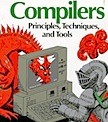Writing A Compiler in Ruby
 Back in March 2008, Vidar Hokstad - a London based Norwegian developer - began to write a series of blog posts on writing a compiler in Ruby from the ground up. Early on, I took objection to some elements of his approach, but it still stands as a great series of posts. Vidar recently reached post 11, providing enough of a landmark to introduce the series as a whole (which is already scheduled to go up to at least 20 posts).
Back in March 2008, Vidar Hokstad - a London based Norwegian developer - began to write a series of blog posts on writing a compiler in Ruby from the ground up. Early on, I took objection to some elements of his approach, but it still stands as a great series of posts. Vidar recently reached post 11, providing enough of a landmark to introduce the series as a whole (which is already scheduled to go up to at least 20 posts).
It's worth noting that there are many different approaches to writing compilers of all types - so don't take the series as a definitive way to develop a compiler. Vidar focuses on outputting x86 assembly language and his example compiler (so far) has very tightly bound AST-walking to code generation stages (with no optimization or intermediate stages).
I'd be particularly intrigued to see similar content from the Ruby community - especially on targeting virtual machines (such as YARV or the Rubinius VM) or on using the Treetop library. For those interested in developing compilers generally, StackOverflow provides a lot of great resources.





October 1, 2008 at 9:03 am
Thanks for the mention, Peter... There'll probably be far more than 20 posts - I'm starting to tinker with it again now in addition to cleaning up the old notes I did, so as long as I don't drown in work all the time it should continue a lot further.
Rest assured that the 32 bit x86 ties will continue to get refactored out - in fact one of my (long term) goals is to implement a technique called Semantic Dictionary Encoding to decouple the code generation completely from the compiler itself.
My initial focus on 32bit x86 was very much a pragmatic choice to get something that generates runnable code as quickly as possible, as I think a lot of compiler texts tend to spend far too much time on the theory, which you eventually need, but it doesn't encourage tinkering and experimenting for a beginner.
In fact, part 11 already makes the main code generation mostly (but not entirely) decoupled from the architecture choice, and a couple more steps down the line it should be trivial to replace the lowest level code to target something else.
As for other approaches, I just added links to Niklaus Wirth's homepage and Jack Crenshaw's "famous" series on building a compiler on the page you linked to - both focus on the top down approach which is of course a lot more common, and I'd absolutely recommend beginners who are seriously interested in compilers read their work - especially the Crenshaw series is very easily approachable for beginners.
October 1, 2008 at 1:26 pm
It's still in progress, but the Duby compiler is written mostly in Ruby. Currently it starts with a Ruby AST out of the JRuby parser. That AST is transformed into a Duby AST with support for static types. The Duby AST runs through a type-inferencing engine, and is finally fed into a compiler backend. Currently the JVM backend is the only functional one, but there's a mostly-broken C backend as a proof of concept. For the JVM backend, a bytecode-emitting library is wrapped with a Ruby DSL. So the far outer edges of the toolchain are not written in Ruby, but the bulk of the middle is.
October 14, 2008 at 5:27 am
For those interested in writing compilers in Ruby, I wrote Ruby bindings for LLVM available at http://github.com/tombagby/llvmruby/tree/master. It makes it easy to emit LLVM bytecode and also to use LLVM as a JIT compiler.
I've blogged a bit about it at http://llvmruby.org and all the features necessary for using LLVM as a compiler backend are supported. Takes away the pain of supporting many target architectures and let's you concentrate on language features.
Here is someone else using it to turn YARV bytecodes to LLVM to native code, http://github.com/miura1729/yarv2llvm/tree/master. My main interest is in writing a Duby or RPython-like compiler targeting LLVM using this library though I have not released that code yet.